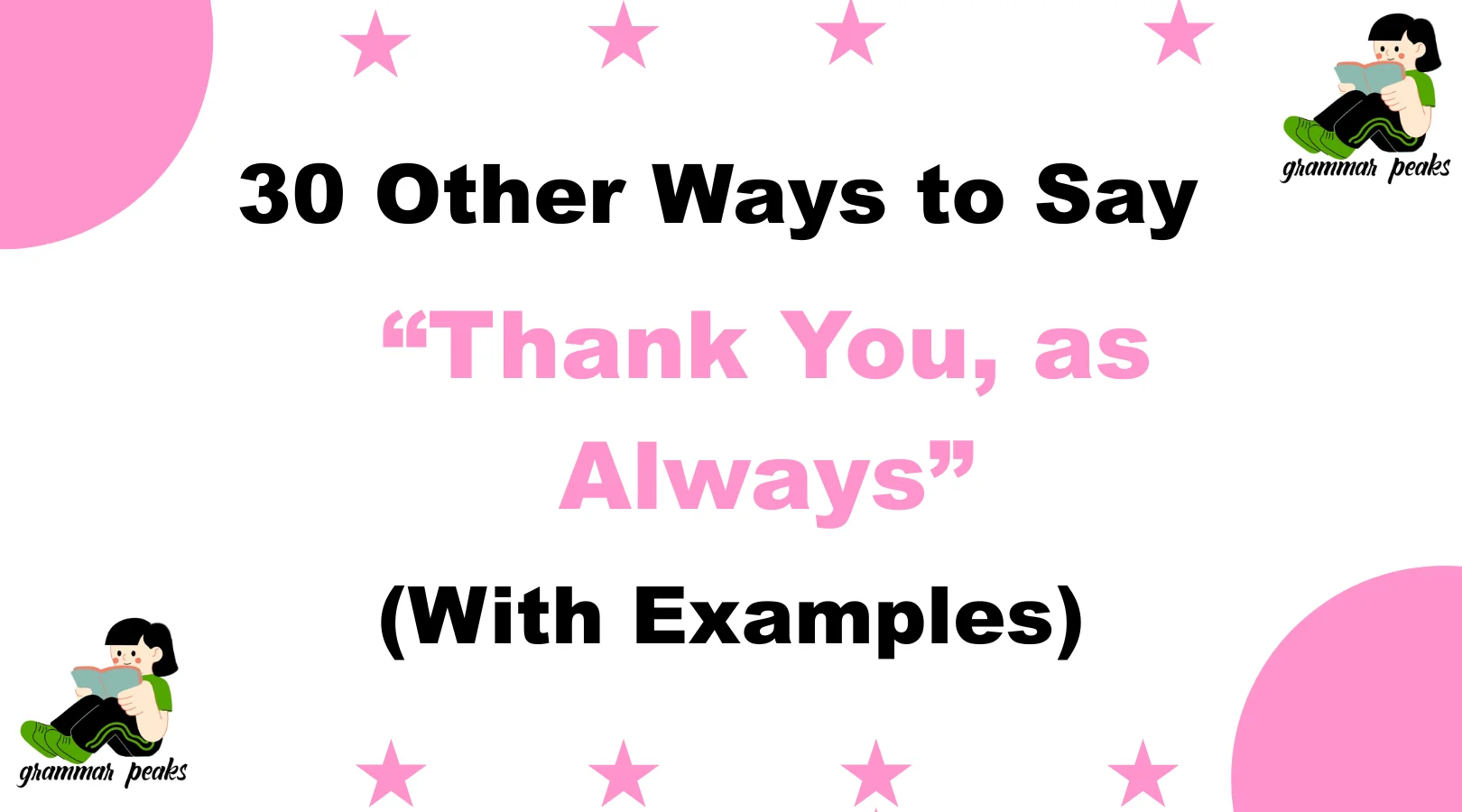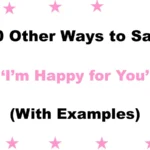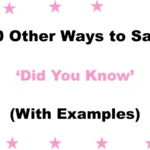Finding the right words to express warmth, care, and gratitude can transform the way we communicate. A heartfelt phrase like “Thank you, as always” shows consistent appreciation, but sometimes, using fresh and thoughtful alternatives can make your message feel more personal, empathetic, and memorable. Whether you’re writing to a friend, client, mentor, or colleague, the words you choose reflect your intentions and emotional tone.
This article explores 30 meaningful alternatives, when to use them, and how to tailor your messages for maximum impact—with examples and context to help you express yourself with genuine heart.
What Does “Thank You, as Always” Mean?
“Thank you, as always” is a phrase used to express consistent appreciation, especially when the person being thanked has been dependable, supportive, or kind repeatedly. The phrase implies a history of goodwill. It’s not just a one-time thank you—it’s a gesture that honors the ongoing support or effort someone provides. It reinforces the bond between speaker and listener.
When to Use “Thank You, as Always”
Use this phrase when:
- You’ve previously thanked the person for similar things.
- You want to express ongoing gratitude.
- You’re speaking to someone you have a trusted relationship with.
- You’re acknowledging efforts that have become routine but still meaningful.
Avoid using it:
- When you’re thanking someone for the first time.
- In one-time interactions or transactions.
- When the context is strictly formal or impersonal.
Is It Professional/Polite to Say “Thank You, as Always”?
Yes—this phrase is both professional and polite when used appropriately. It conveys not only appreciation but also emotional intelligence, making it perfect for building rapport and mutual respect in the workplace or in long-term relationships.
Pros and Cons of Using “Thank You, as Always”
Pros:
- Shows long-term appreciation
- Adds warmth and empathy
- Makes the person feel valued consistently
- Easy to use in emails, cards, messages
Cons:
- Can feel repetitive if overused
- Not ideal for new interactions
- May come off as too casual in highly formal writing
Synonyms For “Thank You, as Always”
- I Appreciate You Every Time
- Thanks, Like Always
- Forever Grateful
- Thanks Once Again
- Much Appreciated, As Usual
- I Can Always Count on You
- You’re Always So Helpful
- With Gratitude, As Always
- I’m Always Thankful
- Many Thanks Again
- Thanks as Ever
- You’re the Best, As Always
- Thank You Endlessly
- Constantly Grateful
- Never Take You for Granted
- Forever in Your Debt
- Can’t Thank You Enough
- You’re Always Appreciated
- Cheers, As Always
- Hats Off to You Again
- Warmest Thanks Yet Again
- Still Grateful
- Thanks for Being You
- Thanks a Ton Again
- Eternally Thankful
- Another Big Thanks
- Appreciate It Like Always
- Once More, Thank You
- Thank You Again and Always
- Thanks for Always Being There
1. I Appreciate You Every Time
Definition: A personal way to express consistent gratitude.
Detailed Explanation: Emphasizes that the person’s actions are always noticed and valued.
Scenario Example:
- “I appreciate you every time you step in and help—thank you.”
Best Use: Personal messages, team conversations.
Worst Use: Corporate legal or rigid formal communication.
Tone: Sincere, personal, steady
2. Thanks, Like Always
Definition: A casual and friendly acknowledgment of consistent support.
Detailed Explanation: A shorter, informal variation of the original phrase.
Scenario Example:
- “Thanks, like always—you really came through.”
Best Use: Among coworkers, friends, or casual emails.
Worst Use: Highly professional or hierarchical situations.
Tone: Relaxed, friendly, easygoing
3. Forever Grateful
Definition: An emotionally deep way of expressing gratitude.
Detailed Explanation: Suggests the action had a big, lasting impact.
Scenario Example:
- “For everything you’ve done, I’m forever grateful.”
Best Use: Emotional notes, thank-you cards, heartfelt messages.
Worst Use: Everyday messages or routine communication.
Tone: Emotional, meaningful, heartfelt
4. Thanks Once Again
Definition: A classic and formal way to express repeated thanks.
Detailed Explanation: A neutral phrase that suits both professional and personal settings.
Scenario Example:
- “Thanks once again for your quick response.”
Best Use: Business emails, customer service.
Worst Use: When trying to sound highly emotional or casual.
Tone: Polite, formal, respectful
5. Much Appreciated, As Usual
Definition: Combines politeness with acknowledgment of routine support.
Detailed Explanation: Reinforces that the person’s help is dependable.
Scenario Example:
- “Much appreciated, as usual—you always deliver!”
Best Use: Work settings, regular collaborations.
Worst Use: For first-time favors or brand-new connections.
Tone: Gracious, reliable, warm
6. I Can Always Count on You
Definition: Expresses trust and reliability in someone’s support.
Detailed Explanation: This phrase highlights that the person is dependable, creating a sense of ongoing gratitude beyond a single act.
Scenario Example:
- “I can always count on you when deadlines are tight—thank you!”
Best Use: Close colleagues, friends, or team members who regularly help.
Worst Use: Formal settings where emotional tones aren’t typical.
Tone: Trusting, warm, appreciative
7. You’re Always So Helpful
Definition: Compliments the person’s helpful nature consistently.
Detailed Explanation: A direct way to show appreciation for someone’s continual assistance or kindness.
Scenario Example:
- “You’re always so helpful with these reports. Thanks a lot!”
Best Use: Informal work emails, chats, or personal messages.
Worst Use: Formal corporate correspondence.
Tone: Friendly, positive, genuine
8. With Gratitude, As Always
Definition: A slightly formal and polished phrase that blends ongoing thanks with professionalism.
Detailed Explanation: It’s a great sign-off or closing phrase that communicates sincere and continued appreciation.
Scenario Example:
- “With gratitude, as always, I look forward to our continued partnership.”
Best Use: Business emails, client communications.
Worst Use: Casual conversations or informal notes.
Tone: Professional, respectful, warm
9. I’m Always Thankful
Definition: Expresses personal and ongoing gratitude.
Detailed Explanation: Shows the speaker’s consistent state of appreciation toward the other person.
Scenario Example:
- “I’m always thankful for your guidance during tough times.”
Best Use: Personal letters, heartfelt messages.
Worst Use: Brief or transactional emails.
Tone: Sincere, intimate, warm
10. Many Thanks Again
Definition: A polite and efficient phrase for repeated gratitude.
Detailed Explanation: Useful when you want to emphasize multiple occasions of thanks without being overly emotional.
Scenario Example:
- “Many thanks again for your quick assistance with the project.”
Best Use: Professional emails and business settings.
Worst Use: Highly personal or emotional expressions.
Tone: Formal, courteous, polite
11. Thanks as Ever
Definition: A concise way to express ongoing thanks.
Detailed Explanation: Implies that the person’s support or kindness is a regular and appreciated occurrence.
Scenario Example:
- “Thanks as ever for your help with the event.”
Best Use: Informal to semi-formal notes.
Worst Use: Highly formal or legal correspondence.
Tone: Casual, friendly, appreciative
12. You’re the Best, As Always
Definition: A warm and friendly way to express admiration and thanks.
Detailed Explanation: Compliments the person’s consistent excellence while showing gratitude.
Scenario Example:
- “You’re the best, as always! Thanks for your support.”
Best Use: Informal emails, messages among friends or coworkers.
Worst Use: Formal professional environments.
Tone: Affectionate, upbeat, casual
13. Thank You Endlessly
Definition: A poetic way to express deep, ongoing gratitude.
Detailed Explanation: Implies gratitude without limits, often used in emotional or artistic contexts.
Scenario Example:
- “Thank you endlessly for your patience and kindness.”
Best Use: Personal letters, cards, or emotional thank-you notes.
Worst Use: Routine business communication.
Tone: Heartfelt, sincere, poetic
14. Constantly Grateful
Definition: Indicates a steady, unchanging feeling of gratitude.
Detailed Explanation: This phrase highlights a lasting sense of thankfulness.
Scenario Example:
- “I’m constantly grateful for your unwavering support.”
Best Use: Personal and semi-formal messages.
Worst Use: Short transactional notes.
Tone: Steady, warm, sincere
15. Never Take You for Granted
Definition: A phrase that shows the speaker’s awareness and appreciation of someone’s consistent effort.
Detailed Explanation: Conveys humility and ongoing gratitude.
Scenario Example:
- “I never take you for granted, thank you as always.”
Best Use: Close relationships or long-term professional bonds.
Worst Use: New or casual acquaintances.
Tone: Humble, sincere, emotional
16. Forever in Your Debt
Definition: An old-fashioned but heartfelt phrase expressing deep gratitude.
Detailed Explanation: Suggests a lasting sense of obligation and thanks.
Scenario Example:
- “I’m forever in your debt for your help during difficult times.”
Best Use: Very close relationships or strong professional mentorships.
Worst Use: Casual or lighthearted interactions.
Tone: Serious, respectful, heartfelt
17. Can’t Thank You Enough
Definition: Expresses that gratitude feels overwhelming or insufficient.
Detailed Explanation: Shows strong appreciation beyond simple thanks.
Scenario Example:
- “I can’t thank you enough for your support during the project.”
Best Use: Personal or emotional thanks.
Worst Use: Routine professional notes.
Tone: Intense, sincere, grateful
18. You’re Always Appreciated
Definition: Communicates ongoing value and thanks.
Detailed Explanation: A straightforward phrase to let someone know they’re consistently valued.
Scenario Example:
- “You’re always appreciated here for your hard work.”
Best Use: Workplace messages or team communications.
Worst Use: Very formal or distant professional contexts.
Tone: Friendly, affirming, warm
19. Cheers, As Always
Definition: A casual, friendly way to say thanks repeatedly.
Detailed Explanation: Common in informal British or Australian English, perfect for friendly emails or messages.
Scenario Example:
- “Cheers, as always, for your quick feedback.”
Best Use: Informal workplace culture or personal notes.
Worst Use: Formal professional or international business.
Tone: Casual, upbeat, friendly
20. Hats Off to You Again
Definition: A celebratory way of showing admiration and thanks.
Detailed Explanation: Conveys respect along with appreciation.
Scenario Example:
- “Hats off to you again for your dedication.”
Best Use: Friendly or semi-formal acknowledgments.
Worst Use: Very formal or technical writing.
Tone: Respectful, warm, celebratory
21. Warmest Thanks Yet Again
Definition: A heartfelt, polite phrase for repeated thanks.
Detailed Explanation: Adds an emotional layer of warmth to gratitude.
Scenario Example:
- “Warmest thanks yet again for your kind assistance.”
Best Use: Customer service or personal professional emails.
Worst Use: Short or blunt communication.
Tone: Warm, polite, sincere
22. Still Grateful
Definition: Indicates ongoing thankfulness despite the passage of time.
Detailed Explanation: Suggests gratitude that lasts beyond the immediate moment.
Scenario Example:
- “I’m still grateful for everything you’ve done.”
Best Use: Follow-up messages or reminders.
Worst Use: First-time thanks.
Tone: Sincere, thoughtful, steady
23. Thanks for Being You
Definition: Appreciates the person’s character alongside their help.
Detailed Explanation: Combines gratitude with personal affirmation.
Scenario Example:
- “Thanks for being you—always so dependable.”
Best Use: Close personal messages.
Worst Use: Professional or formal settings.
Tone: Affectionate, genuine, warm
24. Thanks a Ton Again
Definition: An informal, enthusiastic way of thanking repeatedly.
Detailed Explanation: Emphasizes volume and enthusiasm.
Scenario Example:
- “Thanks a ton again for your quick help!”
Best Use: Informal emails or texts.
Worst Use: Formal writing.
Tone: Energetic, casual, friendly
25. Eternally Thankful
Definition: Expresses timeless and profound gratitude.
Detailed Explanation: Suitable for deep, lasting appreciation.
Scenario Example:
- “I’m eternally thankful for your guidance.”
Best Use: Emotional or personal communication.
Worst Use: Business or routine communication.
Tone: Poetic, sincere, heartfelt
26. Another Big Thanks
Definition: Casual phrase for repeated appreciation.
Detailed Explanation: Friendly and informal, it acknowledges multiple occasions.
Scenario Example:
- “Another big thanks for all your support.”
Best Use: Casual workplace or friend communications.
Worst Use: Formal letters or emails.
Tone: Friendly, informal, grateful
27. Appreciate It Like Always
Definition: Casual phrase expressing ongoing appreciation.
Detailed Explanation: Conveys that the speaker notices and values continual help.
Scenario Example:
- “Appreciate it like always—thanks for the help!”
Best Use: Texts, informal emails.
Worst Use: Formal professional writing.
Tone: Casual, friendly, appreciative
28. Once More, Thank You
Definition: Polite and formal way to say thanks again.
Detailed Explanation: Adds a respectful tone for repeated gratitude.
Scenario Example:
- “Once more, thank you for your attention to this matter.”
Best Use: Professional emails.
Worst Use: Informal chats.
Tone: Formal, polite, respectful
29. Thank You Again and Always
Definition: Emphasizes continuous and repeated gratitude.
Detailed Explanation: Suitable for meaningful relationships or ongoing collaborations.
Scenario Example:
- “Thank you again and always for your kindness.”
Best Use: Semi-formal to formal emails.
Worst Use: One-off or new interactions.
Tone: Warm, respectful, steady
30. Thanks for Always Being There
Definition: Recognizes the person’s constant presence and support.
Detailed Explanation: Ideal for close relationships, shows emotional appreciation.
Scenario Example:
- “Thanks for always being there when I needed you.”
Best Use: Friends, family, or trusted colleagues.
Worst Use: Professional or distant relationships.
Tone: Emotional, sincere, warm
Conclusion
The phrase “Thank You, as Always” is a beautiful way to express ongoing gratitude with warmth and sincerity. However, having a rich vocabulary of alternatives helps you keep your messages fresh, meaningful, and tailored to your relationship and context. Choosing the right phrase depends on factors such as tone, formality, and the closeness of your relationship. Use these alternatives thoughtfully to deepen connections, show genuine appreciation, and communicate your feelings with clarity and care.
5 FAQs about alternative ways to say “Thank you, as always”:
1. What does “Thank you, as always” mean?
Answer:
It expresses ongoing appreciation, typically toward someone who consistently helps or supports you. It’s a way to acknowledge their dependable efforts with gratitude.
2. What are some professional alternatives to “Thank you, as always”?
Answer:
- “I appreciate your continued support.”
- “Thanks, as ever, for your help.”
- “Grateful for your ongoing assistance.”
- “Many thanks for your consistent dedication.”
- “Sincerely appreciate your reliability.”
3. Can I use alternatives in both emails and conversations?
Answer:
Yes. Most variations are appropriate for both written and spoken communication, especially in professional or polite contexts.
4. What’s a more casual version of “Thank you, as always”?
Answer:
- “Thanks again, as usual!”
- “Appreciate it—like always!”
- “Thanks, you’re the best (as always)!”
- “Same old me, always grateful!”
5. When should I avoid saying “Thank you, as always”?
Answer:
Avoid it if:
- You haven’t interacted with the person before (it implies familiarity).
- You want to emphasize a one-time or unusual effort rather than ongoing support.
In those cases, a simple “Thank you so much” or “I appreciate your help today” might be better.

Mia Rose is a passionate Language Coach and Contributor at GrammarPeaks, where she specializes in practical grammar tips and language learning strategies. With a strong foundation in education and communication, Mia brings a friendly, approachable style to her writing. Her goal is to make complex grammar rules simple and usable for learners at any level, helping them grow in both confidence and fluency.





